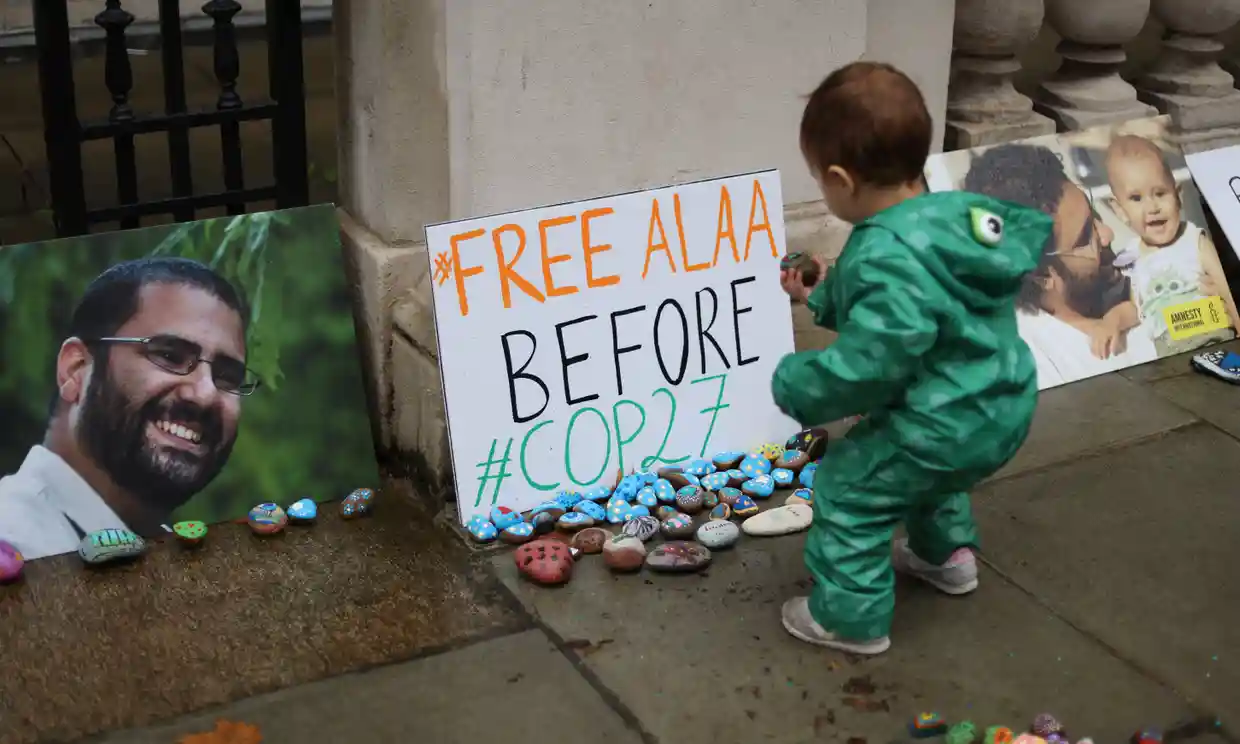In anticipation of local calls for protests during COP27, Egyptian security forces have arrested hundreds of Egyptians over the last couple of weeks.
The UN Climate Change Conference (COP27) kicked off in Sharm El-Sheikh, Egypt on 6th November.
In anticipation of local calls for protests, security forces have arrested hundreds of Egyptians over the last weeks.
Some were rounded up during random stops and searches on the streets of Cairo and elsewhere as Egyptian authorities ramped up security measures ahead of the conference, whilst others were targeted for their social media posts. At least 150 of those rounded uo over the last week remain detained on terrorism charges.
In the ten years since the military coup that overthrew Egypt’s first – and only – democratically elected president, authorities have detained tens of thousands of innocent people. Torture – including sexual assault – is systemic, as are enforced disappearances and extrajudicial executions.
A tale of two civil societies
Egypt has attempted to “greenwash” its image ahead of COP27.
The country’s official website for the conference calls civil society “an indispensable partner in the global effort to combat climate change.” Ironically, the same Egyptian government has tried for the last decade to eliminate any semblance of an independent and active civil society in the country.
FM Sameh Shoukry told the Associated Press in May that he engaged directly with protesters in Denmark and “recognised” their “determination” to achieve goals not dissimilar from the Egyptian government’s own climate aspirations.
In July, Shoukry appointed an official “youth envoy” to the conference charged with “[ensuring] that young voices are heard in the run-up to, during and beyond COP27.”
The notion that the regime of retired field marshal Abdel Fattah al-Sisi cares about its young people rings particularly hollow when one remembers that Anas al-Beltagy – arrested nearly 10 years ago as a teenager – continues to languish behind bars, mostly in solitary confinement, with his only crime being his relationship with his father: a leader in the Muslim Brotherhood.
Equally ridiculous is the assertion that a regime that has outlawed protests and imposed severe restrictions on the ability of independent organisations to operate, regards civil society as a partner in the fight against climate change – rather than as an existential threat to be extinguished.
Egypt’s human rights record
In the months leading up to COP27, Egypt claimed to have improved prison conditions and made progress on the release of tens of thousands of political prisoners.
Courageous Egyptian activists, journalists, and members of civil society have worked to counter this narrative by pointing out that in fact more have been arrested in the same period, and by documenting the inhumane conditions inside the country’s new and widely touted “correctional and rehabilitation” centres.
Yet the Egyptian government continues to receive praise from American officials, who announced in September that military aid to Egypt will be released on the grounds that Cairo makes “clear and consistent progress” on human rights. Senator Chris Murphy called the administration’s decision “disappointing”.
This week, Secretary Blinken told his Egyptian counterpart Sameh Shoukry that he “welcomed” the releases of “significant numbers of political detainees.”
Over 1,400 people have been arrested since April, compared to the 830 releases, activists report. Can freeing a small fraction of Egypt’s political prisoners really be considered progress?
Two US citizens, a mother and her daughter, have been trapped under an arbitrary travel ban in Egypt since 2018. US officials recently recommended that she act like a “better guest” of the country. Is that what President Biden meant when he said he’d put human rights at the forefront of US foreign policy?
Today, many of Egypt’s brightest minds – individuals who are best equipped to tackle the most pressing issues facing our planet – are rotting in prison cells, unsure of when, if ever, they will be reunited with their loved ones.
This includes MIT-educated environmental engineer Seif Fateen, environmental activist Ahmed Abdelsattar Amasha, sustainability-forward businessmen Seif and Safwan Thabet, and veteran activist Alaa Abd El-Fattah, a face of the 2011 Egyptian revolution who has been on hunger strike for over 200 days and who will die inside an Egyptian prison cell before COP27 is over if British authorities do not intervene to secure his release.
A responsibility to speak up
The UK’s prime minister Rishi Sunak wrote to Alaa Abd El-Fattah’s family on Sunday morning, stating that his government is ‘deeply committed to resolving Alaa’s case as soon as possible.’
Still, world leaders including that of US President Biden’s administration, the UK, the EU and other government officials across the world as well as climate campaigners attending the UN Climate Change Conference have a responsibility to speak up for the Egyptian political prisoners and independent civil society organisations, who have been intentionally shut out of COP27.
The government of Qatar also has a responsibility to press Cairo to release Rabie al-Sheikh, Hisham Abdelaziz and Bahaa El-Din Ibrahim, three Al-Jazeera journalists detained in Egypt for simply doing their jobs.
Egypt’s battered civil society has been exposing the Sisi regime’s abysmal rights record for years – and now that all eyes are on the country – will the world finally listen?
Madeleine Hall is a communications specialist at The Freedom Initiative.







